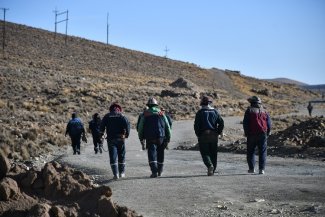Since 1 January 2013, residents of the Estonian capital have been able to use public transport in Tallinn for free after purchasing a special card for €2 euros.
Governments, especially those of high-polluting nations, are leading us deeper into climate disaster. Even if they keep their current climate commitments, global temperatures will rise by around 2.7°C by 2100 – nearly twice over the upper limit to ensure a liveable planet. And that is only if governments uphold their promises. Fifty years of climate projections have proved accurate and predicted today’s dire situation. Meanwhile, the promises of high-polluting nations to cut emissions have fallen short, from the 1997 Kyoto protocol onwards. We have the practical solutions; the greatest barriers to reverting climate change are political and social.
Progress remains inadequate after Glasgow hosted the 26th annual climate summit in late 2021. Pointedly, representatives from the world’s biggest oil and gas companies outnumbered any country’s delegation. Due to lobbying and the revolving door between business, governments and other structures of co-option, high-polluting national governments rarely contradict corporate interests. One example is that governments gift corporations trillions of dollars annually to make our planet unliveable, yet reparations to support those worst impacted remain deficient.
However, cities offer hope. Urban areas create over 70 per cent of climate emissions. Home to an ever-growing majority of the world’s population, they provide space for political and social change: the proximity of people means power can be collectively asserted more strongly than on the level of nation states. People collectively create cities and have since their inception.
Moreover, from the smallest communities right up to the level of cities, a growing surge of municipalities (although I mainly talk about cities in this piece) are reducing emissions and adapting to our over-heating world, often challenging business interests that few of the highest polluting nations have been willing to take on.
In October 2021, the Sierra Leonean capital of Freetown became the first city on the African continent to appoint a chief heat officer, following the example set by Athens, Greece and Miami in the US earlier that year. Eugenia Kargbo will focus on bringing relief to people, especially those in informal settlements, who due to climate change face ever intensifying landslides, fires and life-threatening temperatures. Her role also includes transforming rubbish dumps into parks to stop fires becoming infernos, completing an ongoing project to plant a million trees to shade the city from rising heat and reverse deforestation, and creating a Heat Action Plan.
A third of Freetown’s one million population live in informal settlements, many driven from rural areas by climate-induced factors, including drought. Worldwide, climate change is the leading cause of displacement, resulting in informal settlements around cities to swell. Peer-reviewed science predicts that every rise in degree Celsius will displace a billion more people. Yet nations do not recognise climate refugees. However, cities offer remedy.
In Bangladesh, for example, authorities are earmarking climate resilient urban areas to expand. The southern port city of Mongla is leading this plan to welcome climate refugees, diverting people from Dhaka, the world’s fastest growing megacity. Mongla has also strengthened its flood defences and increased cyclone shelters, is building safe and affordable housing, and is finding other ways to integrate newcomers. This includes encouraging migrant children to continue in education and expanding employment opportunities.
Pathways beyond emissions
Corporate interests in the Global North have caused most of the world’s climate damage, yet cities in the Global South are providing pathways beyond emissions.
For example, blue-sky thinking is changing transport in Bogotá. In 2018, Colombia’s capital inaugurated its first electric cable car to reduce congestion and emissions, and to breathe new life into the city as half of its emissions are transport-related. Since then, Bogotá has added more cable cars, vastly increased cycle lanes, walkways, railway networks and electric buses. Part of this plan involves creating a green corridor called the Carrera Septima, a major artery running through the city’s east reimagined with citizens’ input. Yet Bogotá still has a long way to go in terms of creating a just transition that benefits everyone; for instance, with the electrification of the city’s bus network, many traditional bus drivers are being made redundant.
Like Bogotá, many cities around the world are reducing transport emissions. This is important because transport is the cause of around an eighth of global emissions.
Another sector that accounts for a significant proportion of emissions globally – around a quarter – is electricity and heat creation. To tackle this issue, Cádiz City Council, in southern Spain, used its pre-existing 55 per cent stake in the local energy company to transform it to supply renewable energy in 2018. Since then, it now powers 80 per cent of Cádiz residencies and two adjacent municipalities. Cádiz is not unusual. The Transnational Institute identified how 835 energy, water and other utilities were remunicipalised (taken back into public control) between 2000 to 2017. This change is systemic. Local democratic oversight means companies can prioritise the environment, rather than be dictated by profits. Further benefits from remunicipalisation include securing better working conditions, facilitating democratic accountability, and increasing access to services.
Remunicipalisation has continued to flourish since 2017, including water in Selangor state, Malaysia in 2018; Barcelona electricity in 2019; and Drechtsteden, a cluster of Dutch municipalities building a renewable powered district heating system in 2020. The following year, Helsinki in Finland announced four winners of a million-euro competition to end its coal dependency, including means for the city to trap, store and recycle heat or electrical energy.
Cities: a space for system change
A northern Finnish town, Ii, and its ten thousand residents have cut emissions by 80 per cent from 1990 levels and produce tenfold more renewable energy than it uses. In 2019, Ii won an Innovations in Politics Ecology Award for building momentum towards becoming the world’s first zero-waste municipality, through means including energy efficiency education and workshop spaces so that residents can mend broken things. It produces its energy through solar, wind and bio-waste, reducing what it uses via energy efficiency and real-time monitoring.
Facing Arctic conditions and lacking winter sunlight makes it more impressive that nationally Finland has ambitious emission reduction targets. Its towns and cities are making this happen by sharing expertise: Ii collaborates with other Finnish municipalities through networks including the Towards Carbon Neutral Municipalities, Finnish Sustainable Communities and CircWaste network. Reusing heat in Helsinki or reusing materials in Ii, rather than dumping, is part of a circular economy. Politically this is a shift from an extractive throw-away economy and reduces emissions.
Meanwhile, Amsterdam and Barcelona are a part of a growing number of cities shifting to ‘Doughnut Economics’, a version of circular economics. These cities realise their consumption cannot go beyond what the planet can provide, the outer rim of the doughnut (ecological ceiling), whilst residents need to share a certain amount of resources, the doughnut’s inside (social foundation).
Doughnut Economics is just one way in which cities are forming networks and creating the political transformation necessary to tackle the climate emergency. Another example is the C40 network of nearly 100 local governments making necessary pledges to limit climate change. Another network of cities is the Mayors Migration Council, a city-led response to welcome displaced people. Its members include Freetown alongside the mayors of Kampala in Uganda and Los Angeles in the United States.
Through this growing web of networks, cities can share practical remedies. Compared to national politics, in municipalities there is often a stronger desire to share innovative approaches or push stronger ambitions, including aiming to end fossil fuel use.
New York and other US cities are in the process of suing major oil and gas companies for greenwashing: falsely advertising that fossil fuels are not dangerous. Alongside other C40 cities, Durban, South Africa has divested from fossil fuel investments; whilst locals in Peruíbe, south-east Brazil, petitioned the city government to ban a massive thermoelectric plant and potential future high-carbon developments. Through these means, cities can join the climate movement directly to take on corporations.
As climate science improves and public opinion shifts, there is more and more litigation – both against fossil fuel companies and national governments, with increasing levels of success. Overall, the divestment movement means trillions – for instance, from pension funds – are being redirected from fossil fuels. Resisting high carbon ventures has a tangible impact stopping global warming.
By taking on corporate power, cities – in concert with the climate movement – can build a new system out of the shell of the old. Elevating the importance of cities enables us to demote nation states, in a sense divesting political capital from them. Smaller in scale, the proximity of municipalities provides residents with greater opportunities to create meaningful change, resist vested interests and collectively imagine beyond business as usual. Cities can also overcome social barriers to tackle climate change.
Currently, cities are the epicentres of the extractive economy; for instance, this is where finance and fossil fuel corporations have their headquarters. Cities are also often spaces of unfettered consumption, but in cities we can collectively reimagine this reality.
For instance, in addition to circular economics, a growing number of cities are challenging endless consumption by banning advertisements, a movement that has gone furthest in France. Cities can shift us from a world based on individualism towards universalism, for instance there are a growing number of cities (including Tallin, Estonia and Kansas City, US) that are offering various forms of free public transport, which could help get people out of their cars.
Climate change is man-made, and it must be challenged by people; both replacing fossil fuels’ role as an energy provider and the political power that substantiates this deadly way of life. For cities to tackle climate change, we must challenge governments and corporations. Locally we need to build renewables, adapt to climate change, end waste and network crowd-sourced practical solutions. This is challenging, yet far more plausible than leaving it to the power system that got us here in the first place.













